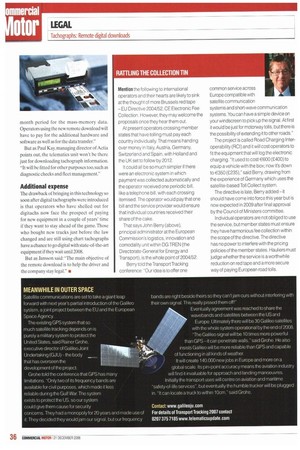RATTLING THE COLLECTION TIN
Page 36

If you've noticed an error in this article please click here to report it so we can fix it.
Mention the following to international operators and their hearts are likely to sink at the thought of more Brussels red tape EU Directive 2004/52, CE Electronic Fee Collection. However, they may welcome the proposals once they hear them out.
At present operators crossing member states that have tolling must pay each country individually. That means handing over money in Italy, Austria, Germany, Switzerland and Spain, with Holland and the UK set to follow by 2012.
It could all be so much simpler if there were an electronic system in which payment was collected automatically and the operator received one periodic bill, like a telephone bill, with each crossing itemised. The operator would pay that one bill and the service provider would ensure that individual countries received their share of the cake.
That says John Berry (above), principal administrator at the European Commission's logistics, innovation and comodality unit within DG TREN (the Directorate-General for Energy and Transport), is the whole point of 2004/52.
Berry told the Transport Tracking conference: "Our idea is to offer one common service across Europe compatible with satellite communication systems and short-wave communication systems. You can have a simple device on your windscreen to pick up the signal. At first it would be just for motorway tolls, but there is the possibility of extending it to other roads."
The project is called Road Charging Interoperability (RCI) and it will cost operators to fit the equipment that will log the electronic charging. "It used to cost €600 (£400) to equip a vehicle with the box; now it's down to E350 (£235)," said Berry, drawing from the experience of Germany which uses the satellite-based Toll Collect system.
The directive is late, Berry added it should have come into force this year but is now expected in 2009 after final approval by the Council of Ministers committee.
Individual operators are not obliged to use the service, but member states must ensure they have harmonious fee collection within the scope of the directive. The directive has no power to interfere with the pricing policies of the member states. Haulers must judge whether the service is a worthwhile reduction on red tape and a more secure way of paying European road toliF,
































































































































































































